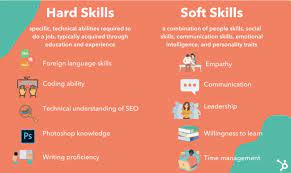The Importance of Developing Skills
Skills are the building blocks of success in both personal and professional life. Whether it’s mastering a new language, honing your technical expertise, or developing soft skills like communication and leadership, continuous skill development is essential for growth and advancement.
One of the key benefits of acquiring new skills is the ability to adapt to an ever-changing world. In today’s fast-paced environment, being able to learn new skills quickly and effectively can give you a competitive edge in the job market and open up new opportunities for career advancement.
Moreover, developing a diverse set of skills can enhance your overall quality of life. From improving problem-solving abilities to boosting creativity and innovation, each skill you acquire adds value not only to your professional life but also to your personal growth and development.
Furthermore, mastering new skills can boost your confidence and self-esteem. As you overcome challenges and expand your knowledge base, you’ll feel more empowered to take on new tasks and responsibilities with a sense of assurance and competence.
It’s important to remember that skill development is a lifelong journey. Embrace every opportunity to learn something new, whether through formal education, online courses, workshops, or hands-on experience. By investing in yourself and continuously expanding your skill set, you’re investing in a brighter future full of possibilities.
Understanding Skills: Examples, Definitions, and Key Hard Skills
- What are 3 skills examples?
- What are examples of skills?
- What is skill in simple words?
- What are the 7 hard skills?
- What are the 5 hard skills?
- What are skills and examples?
What are 3 skills examples?
When considering examples of skills, it’s important to recognise the diverse range of abilities that individuals can possess. Three common skill examples include communication skills, which are crucial for effective interaction and collaboration in both personal and professional settings. Another key skill is problem-solving, where individuals can analyse challenges, develop solutions, and make informed decisions. Additionally, technical skills such as proficiency in software applications or specific tools are highly valued in many industries. These examples highlight the significance of a well-rounded skill set in navigating various aspects of life and work successfully.
What are examples of skills?
When considering examples of skills, it’s important to recognise the diverse range of abilities that individuals can possess. Skills can be categorised into various types, including technical skills such as coding, graphic design, or data analysis, which are specific to certain professions or industries. Soft skills like communication, teamwork, problem-solving, and leadership are equally essential in navigating the complexities of the modern workplace. Additionally, practical skills such as cooking, gardening, or woodworking showcase one’s hands-on abilities and creativity. Each individual brings a unique combination of skills to the table, shaping their strengths and capabilities in both personal and professional realms.
What is skill in simple words?
In simple terms, a skill can be defined as a specific ability or expertise that a person possesses to perform a task effectively. Skills can range from practical abilities such as cooking or driving to more complex capabilities like problem-solving and leadership. Essentially, skills are the tools that individuals develop through learning and practice to accomplish tasks with proficiency and achieve desired outcomes. They play a crucial role in shaping our personal and professional lives, enabling us to navigate challenges, seize opportunities, and continually grow and improve.
What are the 7 hard skills?
When considering the question “What are the 7 hard skills?”, it’s important to recognise that hard skills refer to specific, teachable abilities that can be measured and quantified. These skills are typically job-specific and are acquired through training, education, or practical experience. Some examples of common hard skills include proficiency in a foreign language, technical expertise in software development, data analysis, project management, financial modelling, engineering skills, and medical procedures. Employers often seek candidates with a combination of both hard and soft skills to ensure a well-rounded and capable workforce. Mastering these hard skills can enhance one’s employability and contribute to professional success in various industries.
What are the 5 hard skills?
Hard skills are specific, teachable abilities that can be quantified and measured. When it comes to defining the five key hard skills, they typically include technical proficiencies that are essential in various industries. These may encompass expertise in areas such as programming languages, data analysis, project management, engineering, and financial modelling. Possessing a strong foundation in these hard skills can significantly enhance an individual’s professional capabilities and contribute to their success in a competitive job market.
What are skills and examples?
Skills are the abilities and expertise that individuals possess, enabling them to perform tasks effectively and efficiently. Examples of skills can vary widely, encompassing both technical proficiencies and soft skills. Technical skills include competencies such as programming languages, data analysis, graphic design, and project management. On the other hand, soft skills comprise interpersonal abilities like communication, teamwork, problem-solving, and leadership. Both types of skills are crucial in today’s dynamic work environment, where a well-rounded skill set can enhance one’s employability and success in various fields.

